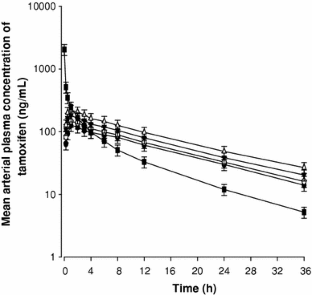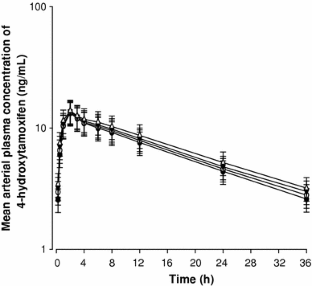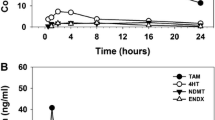Abstract
This study examined the effect of myricetin, an anticancer compound, on the bioavailability and pharmacokinetics of tamoxifen and its metabolite, 4-hydroxytamoxifen, in rats. The effect of myricetin on P-glycoprotein (P-gp), cytochrome P450 (CYP)3A4 and 2C9 activity was evaluated. Myricetin inhibited CYP3A4 and 2C9 activity with IC50 values of 7.81 and 13.5 μM, respectively, and significantly inhibited P-gp activity in a concentration-dependent manner. Pharmacokinetic parameters of tamoxifen and 4-hydroxytamoxifen were determined in rats after oral (10 mg/kg) and intravenous (2 mg/kg) administration of tamoxifen in the presence and absence of myricetin (0.4, 2, and 8 mg/kg). Compared with the oral control group (given tamoxifen alone), the area under the plasma concentration–time curve (AUC0–∞) and the peak plasma concentration (C max) of tamoxifen were significantly (P < 0.05, 2 mg/kg; P < 0.01, 8 mg/kg) increased by 41.8–74.4 and 48.4–81.7%, respectively. Consequently, the absolute bioavailability (AB) of tamoxifen with myricetin (2 and 8 mg/kg) was 29.0–35.7%, which was significantly enhanced (P < 0.05 for 2 mg/kg, P < 0.01 for 8 mg/kg) compared with the oral control group (20.4%). Moreover, the relative bioavailability (RB) of tamoxifen was 1.14- to 1.74-fold greater than that of the control group. The metabolite-parent AUC ratio (MR) was significantly reduced (P < 0.05, 8 mg/kg), implying that the formation of 4-hydroxytamoxifen was considerably affected by myricetin. The enhanced bioavailability of tamoxifen might be mainly due to inhibition of the CYP3A4- and CYP2C9-mediated metabolism of tamoxifen in the small intestine and/or in the liver, and inhibition of P-gp efflux pump in the small intestine by myricetin.




Similar content being viewed by others
References
BIG 1-98 Collaborative Group, Mouridsen H, Giobbie-Hurder A, Goldhirsch A, Thürlimann B, Paridaens R, Smith I, Mauriac L, Price KN, Regan MM, Gelber RD, Coates AS (2009) Letrozole therapy alone or in sequence with tamoxifen in women with breast cancer. New Engl J Med 361:766–776
Bogaards JJ, Bertrand M, Jackson P, Oudshoorn MJ, Weaver RJ, van Bladeren PJ, Walther B (2000) Determining the best animal model for human cytochrome P450 activities: a comparison of mouse, rat, rabbit, dog, micropig, monkey and man. Xenobiotica 30:1131–1152
Buckley MM, Goa KL (1989) Tamoxifen: a reappraisal of its pharmacodynamic and pharmacokinetic properties, and therapeutic use. Drugs 37:451–490
Cao X, Gibbs ST, Fang L, Miller HA, Landowski CP, Shin HC, Lennernas H, Zhong Y, Amidon GL, Yu LX, Sun D (2006) Why is it challenging to predict intestinal drug absorption and oral bioavailability in human using rat model. Pharm Res 23:1675–1686
Choi DH, Li C, Choi JS (2010) Effects of myricetin, an antioxidant, on the pharmacokinetics of losartan and its active metabolite, EXP-3174, in rats: possible role of cytochrome P450 3A4, cytochrome P450 2C9 and P-glycoprotein inhibition by myricetin. J Pharm Pharmacol 62:908–914
Crespi CL, Miller VP, Penman BW (1997) Microtiter plate assays for inhibition of human, drug-metabolizing cytochromes P450. Anal Biochem 248:188–190
Crewe HK, Ellis SW, Lennard MS, Tucker GT (1997) Variable contribution of cytochromes P450 2D6, 2C9 and 3A4 to the 4-hydroxylation of tamoxifen by human liver microsomes. Biochem Pharmacol 53:171–178
Cummins CL, Jacobsen W, Benet LZ (2002) Unmasking the dynamic interplay between intestinal P-glycoprotein and CYP3A4. J Pharmacol Exp Ther 300:1036–1045
Daniel P, Gaskell SJ, Bishop H, Campbell C, Nicholson RI (1981) Determination of tamoxifen and biologically active metabolites in human breast tumour and plasma. Eur J Cancer Clin Oncol 17:1183–1189
Dixon RA, Steele CL (1999) Flavonoids and isoflavonoids—a gold mine for metabolic engineering. Trends Plant Sci 4:394–400
Fried KM, Wainer IW (1994) Direct determination of tamoxifen and its four major metabolites in plasma using coupled column high-performance liquid chromatography. J Chromatogr B Biomed Appl 655:261–268
Fukazawa I, Uchida N, Uchida E, Yasuhara H (2004) Effects of grapefruit juice on pharmacokinetics of atorvastatin and pravastatin in Japanese. Brit J Clin Pharmacol 57:448–455
Gant TW, O’Connor CK, Corbitt R, Thorgeirsson U, Thorgeirsson SS (1995) In vivo induction of liver P-glycoprotein expression by xenobiotics in monkeys. Toxicol Appl Pharmacol 133:269–276
German JB, Walzem RL (2000) The health benefits of wine. Annu Rev Nutr 20:561–593
Guengerich FP, Martin MV, Beaune PH, Kremers P, Wolff T, Waxman DJ (1986) Characterization of rat and human liver microsomal cytochrome P-450 forms involved in nifedipine oxidation, a prototype for genetic polymorphism in oxidative drug metabolism. J Biol Chem 261:5051–5060
Hakkinen SH, Karenlampi SO, Heinonen IM, Mykkanen HM, Torronen AR (1999) Content of the flavonols quercetin, myricetin, and kaempferol in 25 edible berries. J Agric Food Chem 47:2274–2279
Han CY, Cho KB, Choi HS, Han HK, Kang KW (2008) Role of FoxO1 activation in MDR1 expression in adriamycin-resistant breast cancer cells. Carcinogenesis 29:1837–1844
Jacolot F, Simon I, Dreano Y, Beaune P, Riche C, Berthou F (1991) Identification of the cytochrome P450 IIIA family as the enzymes involved in the N-demethylation of tamoxifen in human liver microsomes. Biochem Pharmacol 41:1911–1919
Jordan VC (1989) Fourteenth Gaddum Memorial Lecture. A current view of tamoxifen for the treatment and prevention of breast cancer. Brit J Clin Pharmacol 110:507–517
Jordan VC, Collins MM, Rowsby L, Prestwich G (1977) A monohydroxylated metabolite of tamoxifen with potent antioestrogenic activity. J Endocrinol 75:305–316
Kaminsky LS, Fasco MJ (1991) Small intestinal cytochromes P450. Crit Rev Toxicol 21:407–422
Kelly PA, Wang H, Napoli KL, Kahan BD, Strobel HW (1999) Metabolism of cyclosporine by cytochromes P450 3A9 and 3A4. Eur J Drug Metab Pharmacokinet 24:321–328
Kim CS, Choi SJ, Park CY, Li C, Choi JS (2010) Effects of silybinin on the pharmacokinetics of tamoxifen and its active metabolite, 4-hydroxytamoxifen in rats. Anticancer Res 30:79–85
Kitagawa S, Nabekura T, Takahashi T, Nakamura Y, Sakamoto H, Tano H, Hirai M, Tsukahara G (2005) Structure-activity relationships of the inhibitory effects of flavonoids on P-glycoprotein-mediated transport in KB-C2 cells. Biol Pharm Bull 28:2274–2278
Lewis DFV (1996) Cytochrome P450. Substrate specificity and metabolism. In: Lewis DFV (ed) Cytochromes P450. Structure, function, and mechanism. Taylor & Francis, Bristol, pp 122–123
Lu J, Papp LV, Fang J, Rodriguez-Nieto S, Zhivotovsky B, Holmgren A (2006) Inhibition of mammalian thioredoxin reductase by some flavonoids: implications for myricetin and quercetin anticancer activity. Cancer Res 66:4410–4418
Mani C, Gelboin HV, Park SS, Pearce R, Parkinson A, Kupfer D (1993) Metabolism of the antimammary cancer antiestrogenic agent tamoxifen. I. Cytochrome P450-catalyzed N-demethylation and 4-hydroxylation. Drug Metab Dispos 21:645–656
Middleton E Jr, Kandaswami C, Theoharides TC (2000) The effects of plant flavonoids on mammalian cells: implications for inflammation, heart disease, and cancer. Pharmacol Rev 52:673–751
Rao US, Fine RL, Scarborough GA (1994) Antiestrogens and steroid hormones: substrates of the human P-glycoprotein. Biochem Pharmacol 48:287–292
Shin SC, Choi JS (2009) Effects of epigallocatechin gallate on the oral bioavailability and pharmacokinetics of tamoxifen and its main metabolite, 4-hydroxytamoxifen, in rats. Anticancer Drugs 20:584–588
Shin SC, Piao YJ, Choi JS (2008) Effects of morin on the bioavailability of tamoxifen and its main metabolite, 4-hydroxytamoxifen, in rats. In Vivo 22:391–395
Sutherland L, Ebner T, Burchell B (1993) The expression of UDP-glucuronosyltransferases of the UGT1 family in human liver and kidney and in response to drugs. Biochem Pharmacol 45:295–301
Turgeon D, Carrier JS, Levesque E, Hum DW, Belanger A (2001) Relative enzymatic activity, protein stability, and tissue distribution of human steroid-metabolizing UGT2B subfamily members. Endocrinology 142:778–787
von Moltke LL, Weemhoff JL, Bedir E, Khan IA, Harmatz JS, Goldman P, Greenblatt DJ (2004) Inhibition of human cytochromes P450 by components of Ginkgo biloba. J Pharm Pharmacol 56:1039–1044
Wacher VJ, Wu CY, Benet LZ (1995) Overlapping substrate specificities and tissue distribution of cytochrome P450 3A and P-glycoprotein: implications for drug delivery and activity in cancer chemotherapy. Mol Carcinog 13:129–134
Wolozin B, Kellman W, Ruosseau P, Celesia GG, Siegel G (2000) Decreased prevalence of Alzheimer disease associated with 3-hydroxy-3-methyglutaryl coenzyme A reductase inhibitors. Arch Neurol 57:1439–1443
Author information
Authors and Affiliations
Corresponding author
Rights and permissions
About this article
Cite this article
Li, C., Lim, SC., Kim, J. et al. Effects of myricetin, an anticancer compound, on the bioavailability and pharmacokinetics of tamoxifen and its main metabolite, 4-hydroxytamoxifen, in rats. Eur J Drug Metab Pharmacokinet 36, 175–182 (2011). https://doi.org/10.1007/s13318-011-0036-y
Received:
Accepted:
Published:
Issue Date:
DOI: https://doi.org/10.1007/s13318-011-0036-y




